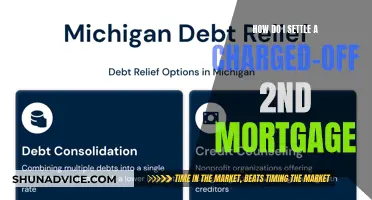
Renewing your mortgage is a straightforward process, but it's important to understand your options to avoid missing out on savings. When your mortgage term ends, you can either pay off your mortgage in full or renew it. You'll receive a renewal notice at least 21 days before the end of your current term, but you can start shopping around for a new lender a few months in advance. While it's possible to renew with your current lender, you may get a better rate by switching, and you can negotiate with your current lender if you have a competitive offer from another institution. It's also worth considering whether you can reduce your overall mortgage size by making a lump-sum payment or increasing your monthly payments before the renewal.
How do I renew my mortgage?
| Characteristics | Values |
|---|---|
| When to renew | At the end of each term, unless you pay the balance in full. |
| Renewal notice | You'll receive a notice at least 21 days before the end of your current term. |
| Renewal timing | Many lenders allow renewal up to 120 days before the end of the term. |
| Renewal options | You don't have to renew with the same lender. You can move to another lender or negotiate with your current lender for a better rate. |
| Renewal rate | The rate offered at the time of renewal may fluctuate between the time you agree to renew and the expiry date of your current term. |
| Renewal term | A mortgage term generally varies between 3 and 10 years, with terms of 3 or 5 years being more common. |
| Renewal fees | If your mortgage is registered with a collateral charge, you may have to pay fees to switch lenders. |
| Renewal payment | You can increase your payments to pay off your mortgage faster and save on interest. |
| Renewal insurance | Review your insurance needs, such as life, critical illness, disability, or employment insurance. |
| Renewal budget | Prepare a budget and modify your spending habits to ensure you can meet the new financial requirements. |
What You'll Learn
- Renewal options: You can renew with a new lender to get a better rate
- Renewal timing: You can renew up to 120 days before the end of your term
- Renewal rates: The rate at renewal may differ from the rate at expiry
- Renewal costs: Extending amortization lowers payments but increases interest costs
- Renewal preparation: Prepare a budget and review your mortgage needs

Renewal options: You can renew with a new lender to get a better rate
Renewal options are an important consideration when your mortgage term comes to an end. You are not required to renew your mortgage with the same lender. You can move your mortgage to another lender if their conditions better suit your needs.
Start shopping around a few months before the end of your term. Contact various lenders and mortgage brokers to check if they offer mortgage options that better suit your current financial situation and needs. Don’t wait until you receive the renewal letter from your lender. Negotiate with your current lender. You may qualify for a discounted interest rate that is lower than the rate quoted in your renewal letter. Tell your lender about offers you received from other financial institutions or mortgage brokers. You may need to provide proof of the offers you receive. Make sure you have this information on hand. If you don’t take action, the renewal of your mortgage term may be automatic, which means you may not get the best interest rate and conditions.
If you have a mortgage that is about to be renewed, your balance is 250,000, your remaining amortization period is 20 years, and your actual rate is 3%. If you renew at a rate of 5%, your annual payment will increase by more than 3000 or 250 per month. If you renew at 6%, the annual increase will be over 4750, which translates to almost $400 per month. So, as you can see, this is a significant increase.
To prepare for your mortgage renewal and optimise your overall financial situation, you can modify your spending habits to lower your expenses. If you can, increase your payments to pay off your mortgage faster and save on interest. Consider the possibility of refinancing your property to help restructure your debts. Keep your insurance to protect yourself from unexpected events.
Removing a Name from Your Mortgage: What You Need to Know
You may want to see also

Renewal timing: You can renew up to 120 days before the end of your term
Renewal timing is an important aspect of the mortgage renewal process. Most lenders will allow you to renew your mortgage up to 120 days before the end of your term, without any prepayment fees or penalties. This means that if you have less than 120 days left on your current mortgage term, you can start the renewal process early and lock in your new rate and terms.
Starting the renewal process early can have several benefits. Firstly, it gives you more time to explore your options and make informed decisions. You can research different lenders, compare rates, terms, and features, and choose the renewal term that best fits your financial goals and circumstances. Life events and financial circumstances can change over time, so this is an opportunity to review your situation and make any necessary adjustments.
Additionally, starting the renewal process early can help you maximize your discounts and incentives. Some lenders offer exclusive low rates and promotional incentives for committing to renew your mortgage early, but these may be contingent on signing the renewal agreement a certain number of days before your current term ends. For example, Vancity offers exclusive low rates and member rewards for early renewals, but these are only available if you sign the renewal documentation at least 60 days before your current term expires.
It's important to note that if you don't take any action towards renewing your mortgage, your lender may automatically renew it for you at their posted rate or the rate that would ordinarily apply on the day after your term expires. This means you may not get the best interest rate and terms available, so it's in your best interest to start the renewal process early and be proactive in exploring your options.
Strategies to Remove Private Mortgage Insurance from Your Home Loan
You may want to see also

Renewal rates: The rate at renewal may differ from the rate at expiry
When it comes to renewing your mortgage, it's important to understand that the rate offered at the time of renewal may differ from the rate at expiry. This means that even if you agree to a renewal rate, it can still fluctuate based on market rates until the maturity date of your current term. For example, if you agree to renew at a rate of 5%, but market rates drop before your current term expires, you can ask your lender for a better rate. On the other hand, if market rates increase, your agreed-upon rate will be guaranteed until the maturity date of your current term.
To ensure you're getting the best rate, it's a good idea to start shopping around a few months before the end of your term. Contact various lenders and mortgage brokers to see if they can offer you a better rate or different mortgage options that suit your needs. Don't wait until you receive the renewal letter from your current lender, as you may be able to qualify for a discounted interest rate. It's also worth noting that you don't have to renew your mortgage with the same lender. If you find a better offer elsewhere, you can switch lenders, although you may have to pay fees for removing the collateral charge from your existing mortgage and registering the new one.
To prepare for your mortgage renewal, you may need to modify your spending habits and lower your expenses. This can help you increase your payments and pay off your mortgage faster, saving you money on interest. It's also a good idea to update your budget to include any expected increases in your mortgage payments. That way, you can ensure you have enough room in your budget to meet your new financial requirements. Additionally, consider using a mortgage calculator to estimate your payment amounts and interest costs under different renewal rates.
External factors, such as macroeconomic conditions and interest rate decisions by central banks, can also impact the rate at renewal. For example, high inflation may lead to concerns about potential rate hikes, which can affect the rates offered by lenders. Keeping an eye on these broader market trends can help you anticipate and prepare for potential changes in your renewal rate.
Removing Yourself from a Joint Mortgage: A Step-by-Step Guide
You may want to see also

Renewal costs: Extending amortization lowers payments but increases interest costs
When it comes to mortgage renewal, one of the key considerations is the amortization period, which is the full length of time it takes to pay off the mortgage in full. While extending the amortization period can lower your monthly payments, it's important to be aware that this will also result in higher interest costs over the lifetime of the mortgage. This can add up to thousands or even tens of thousands of dollars in additional interest payments.
For example, let's consider a $300,000 mortgage with a 5-year term and a 25-year amortization period. With a 4% interest rate, the monthly payments would be $1,432.25. However, if you extend the amortization period to 30 years, the monthly payments would decrease to $1,300.42, a difference of $131.83 per month. Over the full 30-year period, the total interest paid would be $214,513, compared to $177,755 for the original 25-year amortization, an increase of $36,758.
The decision to extend the amortization period should not be taken lightly, as it can have significant financial implications. It is crucial to carefully consider your budget and financial situation before making any decisions. Additionally, it is worth noting that the interest rate offered at the time of renewal may fluctuate, and it is often possible to negotiate a lower rate with your lender or mortgage broker.
To make an informed decision, it is recommended to start shopping around a few months before the end of your current term. Contact various lenders and mortgage brokers to explore their offerings and determine if they can provide better terms that suit your needs. You may also want to consider refinancing your property to help restructure your debts and potentially lower your interest costs.
In summary, while extending the amortization period can provide immediate payment relief by lowering your monthly payments, it is important to be mindful of the long-term financial implications, including the potential for significantly higher interest costs over the lifetime of the mortgage.
Recalculating Your Mortgage Term: What You Need to Know
You may want to see also

Renewal preparation: Prepare a budget and review your mortgage needs
Preparing a budget and reviewing your mortgage needs are crucial steps when renewing your mortgage. Here are some detailed instructions to help you navigate the process:
Prepare a budget:
Start by assessing your current financial situation and comparing it to when you initially took out the mortgage. Consider any changes in your income, expenses, and overall financial health. For instance, you may have received a raise or are dealing with additional expenses, such as a car loan or increased costs due to the rising inflation. Evaluate how much you can devote to repaying your mortgage. If your mortgage payments are expected to increase, consider setting aside an extra amount to gradually adjust to the new budget. This proactive approach will help you save for an emergency fund or make a lump-sum payment during renewal.
Review your mortgage needs:
It is essential to review the terms and conditions of your agreement to ensure they still align with your needs. Consider whether you want to make changes to your rate type (fixed or variable), the mortgage term, payment frequency, or amortization period. Assess your financial goals and risk tolerance. If you plan to start a family or make home improvements, you may need a mortgage that offers flexibility or allows you to build an emergency fund. Additionally, evaluate your satisfaction with your current lender and explore other options if more favourable terms or rates are available elsewhere.
Understand the market and seek advice:
Stay informed about the latest mortgage rates and market conditions. This knowledge will empower you to negotiate better terms with your current lender or explore alternative lenders. Contact various lenders and mortgage brokers to discuss your options and determine if their conditions suit your needs. Consult a mortgage advisor well in advance of your renewal date to gain insights into different mortgage products and make informed decisions.
Paying Off Your Chase Mortgage: Strategies for Success
You may want to see also
Frequently asked questions
You will receive a mortgage renewal notice at least 21 days before the end of your current term. You can renew your mortgage with your current lender by signing and sending back the renewal slip. However, you don't have to renew with the same lender and may be able to get a lower rate by switching.
Start shopping around a few months before the end of your term. Contact various lenders and mortgage brokers to check if they offer better rates and conditions. You may qualify for a discounted interest rate that is lower than the rate quoted in your renewal letter.
Your existing lender has less incentive to provide you with the most competitive rates as they already have your business. By switching, you could save money and take advantage of cash bonuses and insurance discounts.
It's important to make sure that your payments fit within your budget. You may need to reduce other expenses or increase your payments to pay off your mortgage sooner and save on interest. You should also consider the possibility of refinancing your property to help restructure any debts.







